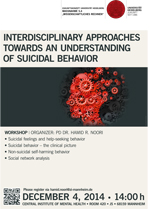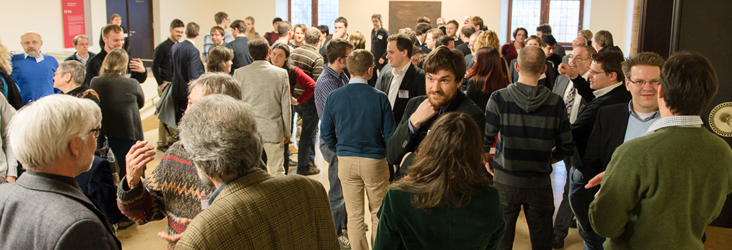
Events 2014
The Interdisciplinary Center for Scientific Computing (IWR) and its affiliated institutions organize a large number of events for discussing latest scientific results as well as identifing upcoming challenges in the field of Scientific Computing. In addition the IWR regularly hosts events which emphasis on broadening and improving the interdisciplinary dialogue.

ZUK 5.4 Workshop
“Visual Crowds for Geo- and Environmental Sciences”
December 9, 2014
Crowdsourcing has been a buzzword since its conception by Wired-Author Jeff Howe. In the approximately past ten years, thousands of websites, companies and research articles popped into existence. Now, the term crowd* (e.g. crowdfunding, crowdcreativity, etc.) reflects that we are facing a diversification and possibly babylonization of approaches.
In this workshop, we want to tie existing threads of research together: human computation is an important factor in both geoscience and computer vision research. In geosciences, OpenStreetMap is one of the best-known successful examples, but only one of numerous recent advances. In environmental sciences huge amounts of data are collected, such as high-speed recordings of fluids, thousands of meters of glacier ice drilling cores or satellite data depicting e.g. sand transport in the Sahara desert. In computer vision everything started out with the ESP Game, Peekaboom and the LabelMe tools. Today, crowdsourcing is used in almost every discipline dealing with image data. However, these communities rarely talk with each other. Publications are mainly focused at the disciplines’ top journals with little to no overlap. Heidelberg University has been an international leader in the analysis, advancement and application of OpenStreetMap, reflected e.g. by its graduate school CrowdAnalyser dedicated to this topic. The Heidelberg Center for the Environment connects a wide array of research fields ranging from natural sciences to social and cultural sciences. The Heidelberg Collaboratory for Image Processing is one of the largest institutes for computer vision in Germany with more than 80 researchers working in all subfields ranging from machine learning over early vision to scene parsing.
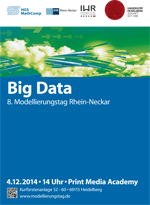
8. Modellierungstag Rhein-Neckar „Big Data“
December 4, 2014
Workshop on current and future developments regarding Scientific Computing and „Big Data“.
In jüngster Zeit unterliegt der Begriff „Big Data“ einem stetigen Bedeutungswandel und beschreibt nicht mehr nur zu große und zu komplexe Datenmengen, welche auch raschen Veränderungen unterliegen können – eine Verarbeitung dieser mit Hilfe klassischer Methoden ist dann nicht mehr möglich. Vielmehr bezieht sich „Big Data“ ebenfalls auf die entsprechenden Konzepte, Methoden, Technologien und Tools, welche zum Sammeln und Auswerten benötigt werden.
Die Menge der Daten wächst stetig. Nicht nur im Bereich Social Media oder der Business Transaktionen ist dies zu beobachten, sondern auch in Industrie und Handel. Aufgabe hier ist es, den Wert der Daten zu bestimmen und zu nutzen. Nicht wenige Unternehmen speichern Daten im Petabyte-Bereich, bei einer täglichen Verarbeitung von Daten im dreistelligen Terabyte-Bereich.
- Wie kann aus den erhaltenen Datenfluten gezielte Information extrahiert werden?
- Welche technischen Voraussetzungen sind notwendig, um Datenschutz und Datensicherheit zu gewährleisten?
- Welche Herausforderungen stellen sich bei Zusammenführung sowie richtiger Verwendung firmeneigener und öffentlicher Daten?
Der Modellierungstag eröffnet als Plattform die Möglichkeit, die Kommunikation zwischen Industrie und Universität zu diesem umfassenden Thema auszudehnen. Die zunehmende Komplexität der Anwendungen im Bereich Big Data führt durch das Zusammenspiel vieler Hard- und Softwarekomponenten zu einer Intelligenz der Systeme, die vieles Konventionelle überholt.Das Meistern dieser Komplexität ist ein Anknüpfungspunkt für den Austausch zwischen Universität und Industrie.
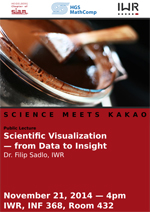
SIAM Heidelberg Chapter Public Lecture
"Scientific Visualization - from Data to Insight"
Dr. Filip Sadlo, Guest Member IWR
November 21, 2014
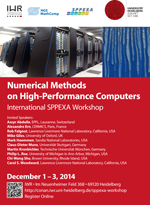
International SPPEXA Workshop:
„Numerical Methods on High-Performance Computers“
December 1-3, 2014
The aim of this workshop is to bring together computer scientists and mathematicians to provide an overview of the state-of-the-art in numerical methods for the solution of partial differential equations and related fields in order to discuss the mutual implications of expected exascale hardware and these numerical algorithms. The workshop is part of DFG's Priority Programme 1648 "Software for Exascale Computing". The conference will take place at the Interdisciplinary Center for Scientific Computing (IWR).
Symposium on Simulation and Optimization of Extreme Fluids
November 10-12, 2014
In many problems in the field of fluid mechanics, extreme conditions arise which cannot be handled appropriately by most analytical and numerical methods: For instance, the modeling of high fluid pressures in ball bearings or the consideration of different cell types in a blood stream in small vessels lead to complex fluid dynamical models of non-Newtonian type. This models contain strong nonlinearities and couplings of continuum mechanics to particle mechanics. Therefore, they constitute a big challenge for the numerics. Usual methods often can deal well with parts of the model. However, they are mostly not capable of solving the whole coupled problems. Algorithms for optimal control and parameter estimation often require high regularity and certain structural properties of the solution which are not given here. Further difficulties may arise due to complex geometries or moving interfaces.
This workshop brings together experts and junior scientist in the fields of modeling, simulation, and optimization of extreme fluids. Aim of the workshop is to leave established ways of thinking and to discuss approaches and possibilities especially for that regions where available methods come to their limits.
Subsequent to the symposium a Winter School will take place on November 13-14, 2014 at IWR Heidelberg.
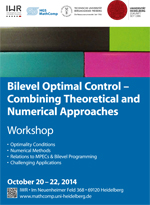
Workshop: Bilevel Optimal Control - Combining Theoretical and Numerical Approaches
October 20-22, 2014
The workshop is concerned with the theory and the numerics of bilevel optimal control problems, which are optimal control problems, mainly in ordinary differential equations, with two levels of optimization. We intend to discuss theoretical aspects like optimality conditions and stationarity concepts of this problem class, but we are also concerned with the development of efficient solution algorithms and the corresponding convergence theory. Furthermore, challenging applications from fields like image processing, medicine or robotics are presented.
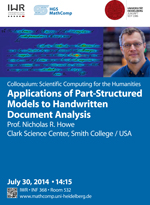
Colloquium: Scientific Computing for the Humanities
„Applications of Part-Structured Models to Handwritten Document Analysis"
Prof. Nicholas R. Howe, Clark Science Center / Smith College, USA
July 30, 2014
Part-structured models were first developed for the task of photographic object recognition, but recently they have been used to solve problems in document analysis. The models allow incorporation of spatial constraints between component parts using springlike potentials, and inference on them can be efficiently performed through a form of dynamic programming. This talk will describe the use of one particular form of part-structured model, the inkball model, and examine its application to word spotting, character detection, word recognition, and writing style comparison.
PDESoft 2014 Heidelberg & Coding Days
July 14-18, 2014
Simulation software for complex phenomena based on models involving partial differential equations (PDE) has become an important topic in modern research from mathematics and scientific computing providing methods and algorithms to application fields utilizing codes and defining requirements on their technical abilities. Powerful, but also complex mathematical algorithms and advanced hardware architectures have widened the span of practically computable problems considerably. But this power does not come for free and is typically related to complex implementations which have to be developed over many years. The development of powerful, academic, multi-purpose libraries for PDE simulation began about 1990. Nowadays, there are several widespread codes which are well developed and well maintained. These codeas have different characteristics, making them better suited for different problems.
The 2014 conference will be hosted jointly by the Heidelberg Institute for Theoretical Studies (HITS) and Heidelberg University's Interdisciplinary Center for Scientific Computing (IWR). The presentations and discussions will take place at the Studio Villa Bosch in Heidelberg, Germany.
The conference is followed by coding days (July 17-18) at the IWR. Two days of joint coding. We will set up infrastructure (power and ethernet) in a single room such that participants can discuss while writing code on their laptops and other devices.
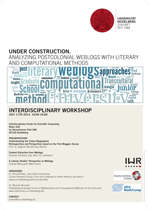
Interdisciplinary Weblog-Workshop
„Under construction. Analyzing postcolonial weblogs with literary and computational methods”
July 11, 2014
The junior research group “From the Caribbean to North-America and Back“ (Transcultural Studies, University of Heidelberg) and the Heidelberg Graduate School of Mathematical and Computational Methods for the Sciences (HGS MathComp) are organizing the interdisciplinary workshop „Under construction: Analyzing postcolonial weblogs with literary and computational methods“.
The workshop makes academic approaches to personal weblogs accessible which include the very divergent areas of postcolonial literary studies, computational and engineering sciences. The main object of the event is to mediate a dialogue between the various disciplines. For this purpose, three scientists will give us insights into their research: Prof. Dr. Dagmar Monett Diaz from the Berlin School of Economics and Law, who will talk about the Cuban Blogosphere and its census; Andreas Schieber from the Technical University of Dresden, who will discuss the method of content extraction in weblogs; and Chantal Marquardt from the University of Mannheim, who will elaborate on literary approaches to Francophone North African weblogs.
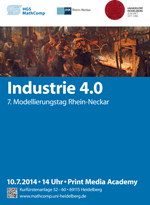
7. Modellierungstag Rhein-Neckar „Industrie 4.0“
July 10, 2014
Workshop on current and future developments regarding Scientific Computing and „Industry 4.0“.
Der Modellierungstag ist eine wichtige Plattform zur Vernetzung der akademischer Spitzenforschung mit den international erfolgreichen Industrieunternehmen in der Metropolregion Rhein-Neckar. Im Mittelpunkt dieser zum 7. Mal stattfindenden Veranstaltung steht in diesem Jahr das Thema „Industrie 4.0“.
Teilnehmer aus Wissenschaft und Industrie werden im Rahmen von Vorträgen und Diskussionsrunden die aktuellsten Ergebnisse sowie zukünftige Entwicklungen auf diesem Gebiet erörtern. Von zentraler Bedeutung wird die Frage sein, wie Wissenschaftliches Rechnen und Industrie 4.0 weitere Synergieeffekte erzeugen und nutzen können.
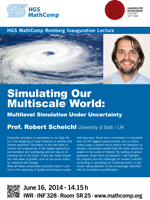
HGS MathComp Romberg Visiting Scholar Inauguration Lecture
„Simulating Our Multiscale World: Multilevel Simulation Under Uncertainty“
Prof. R. Scheichl, University of Bath, UK
June 16, 2014
Computer simulation is everywhere in our daily life, be it the designing of novel materials or weather and climate prediction. Simulation is the new heart of science and engineering. It has largely replaced experimentation and prototyping and will play an increasing role in the future. It also has made inroads into new areas of growth, such as the social sciences, medicine and biology.
What all these complicated processes have in common is the vast array of spatial and temporal scales that they span. Brute force computation is impossible even on the biggest supercomputer, and so mathematics plays a central role to reduce the behavior to simpler, computable models that still retain predictive power on the scales of interest. By looking at various examples, drawn from my research, I will highlight the progress and the challenges for modern scientific computing in simulating our multiscale world, in particular calling attention to the increasingly important field of uncertainty quantification.
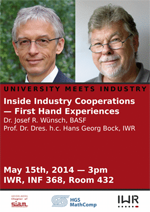
SIAM Heidelberg Chapter Symposium
„University meets Industry - First hand experiences“
May 15, 2014
The SIAM Student Chapter at Heidelberg University held the SIAM symposium “University meets Industry – First hand experience” on the May 15th, 2014. The Symposium featured talks of Dr. Josef R. Wünsch, Senior Vice President for Formulation, Mathematics, Modelling & Technology Incubation at BASF SE and Prof. Dr. Dres. h.c. Hans Georg Bock, managing director of the Interdisciplinary Center for Scientific Computing (IWR).
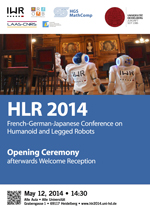
HLR 2014 - French-German-Japanese Conference on Humanoid and Legged Robots
May 12-14, 2014
The construction of humanoid and bipedal robots based on humans and legged animals, is a complex, interdisciplinary and rapidly evolving research field. There are diverse scientific challenges in designing a robot that can walk, run, jump, and move in a robust manner similar to its biological counterpart. Technical applications of such robots are expected in the near future in fields ranging from service robotics (households, public or industrial environments, hazardous sites) to medical robotics (neuro-prosthetics, exo-skeletons etc).
This conference aims to bring together leading researchers from France, Germany and Japan to hold technical talks and discussions on the topics related to Humanoid and Legged Robots.

HGS MathComp Public Lecture
„Wissenschaft mit AHA-Effekt - Die ‚Pützmunter-Show‘ mit Experimenten zum Staunen & Schmunzeln“
Jean Pütz, Wissenschaftsjournalist, Fernsehmoderator
April 11, 2014
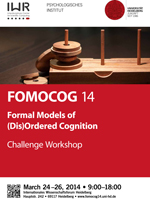
FOMOCOG 14 - Challenge Workshop on Formal Models of (Dis)Ordered Cognition
March 24-26, 2014
Computational modeling and simulation of human cognition is an emergent multidisciplinary field of research promising breakthroughs for both basic research and applications. There is already a wide range of notable examples illustrating the successful application of computational modeling in cognition from models of working memory to intelligent tutoring systems. However, many psychiatric and neurological disorders involve characteristic cognitive deficits that still are poorly understood on a process level. Quantitative cognitive process models promise to contribute towards filling the explanatory gap between models of basic neural mechanisms and high-level cognitive abilities. Mathematical methods and computational tools for process modeling, which have a long success story in other disciplines, e.g. chemical engineering, may help to address the challenges and potential pitfalls arising in this approach. A successful implementation, however, requires a broad range of skills and knowledge.
Therefore, in this challenge workshop, we bring together experts from the different fields of cognitive modeling, cognitive disorders, and process modeling. The aim is to facilitate the exchange about research questions in domains like psychiatry, neuroscience, or cognitive science, which may be addressed by methods of process modeling. We will discuss the available methodological approaches and tools as well as their limitations in order to foster effective future collaborations.
The focus of this workshop will be on higher cognition and its disorders, including process models of the underlying neural activity. A methodological focus will be on effective parameter estimation methods, model validation procedures, model-based optimum experimental design, and the application of these methods to models of cognition.
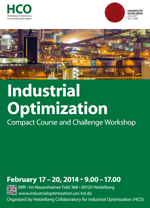
HCO Workshop Industrial Optimization 2014
February 17-20, 2014
Optimization plays a crucial role in the design and operation of industrial processes due to the desire to save valuable resources, to meet ambitious production goals, and to achieve the best possible profit margins. Often the processes under consideration are nonlinear and dynamic by nature, thus complex dynamic optimization or optimal control problems need to be formulated and solved. Recent years have seen rapid progress in this area, both algorithmically and in terms of solvable applications. However, this area still raises major challenges for scientific computing and interdisciplinary collaboration.
The aim of this workshop is to bring together scientists and decision makers from industry and academia to initiate joint projects on industrial optimization. The event will start with a two-day course about topics from modeling, simulation, optimization and model validation. On the third day successful case studies from previous and present collaborations will be shown. The fourth day is intended for discussions about present and future challenges which could lead to new projects within structured collaboration in an Industry-on-Campus initiative.

HGS MathComp Fireside Chat
„Combining Career and Family – a Big Challenge?“
February 11, 2014
During the upcoming Fireside Chat we are going to discuss a hotly debated topic among young scientists - the challenge of combining career and family. For this special occasion we have invited three renowned scientists who are going to share their personal experience with you. Our guests will be:
Prof. Angelika Altmann-Dieses, Vice Dean Faculty of Management Science and Engineering, University of Applied Sciences Karlsruhe
Prof. Heike Leitte, Junior Professor Computer Graphics and Visualization (IWR)
Prof. Fred Hamprecht, Professor for Multidimensional Image Processing, Heidelberg Collaboratory for Image Processing (HCI)
International Symposium - Modeling and Simulation of the Cardiovascular System
February 10-12, 2014
International Symposium on topical challenges to mathematical modeling and simulation of the cardiovascular system with focus on the following subjects:
Modeling, Analysis
Biomechanical interaction of blood flow with the vessel wall and tissue reactions and transport processes in blood flow and the vessel wall; Mechanics of the vessel walls including information on microstructures;Deposition and chemical processes and their influence on the vessel wall; Thrombus and plaque formation;Vessel occlusion and infarcts; Methods and techniques for calibration and validation based on medical data
Numerical Methods and Simulation
Methods for long time processes; Simulations of fluid-structure interaction and related free boundary problems; Methods for processes with large deformations; Report and discussion of simulations results and their medical implications
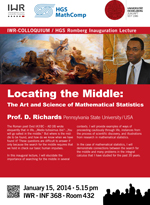
HGS MathComp Romberg Guest Professorship Inauguration Lecture
„Locating the Middle: The Art and Science of Mathematical Statistics“
Prof. D. Richards, Pennsylvania State University, USA
January 15, 2014
The Roman poet Ovid (43BC – AD18) wrote eloquently that in life, „Medio tutissimus ibis“: „You will go safest in the middle.“ But where is the middle to be found, and how do we know when we have found it? These questions are difficult to answer if only because the search for the middle requires that we hold in check our basic human impulses.
In this inaugural lecture, I will elucidate the importance of searching for the middle in several contexts. I will provide examples of ways of proceeding cautiously through life, instances from the process of scientific discovery, and illustrations from research in mathematical statistics.
In the case of mathematical statistics, I will demonstrate connections between the search for the middle and many problems in the integral calculus that I have studied for the past 35 years.
